How do you learn to love a body that let you down?
A personal story of grief, healing, and learning to love the body I once hated.
Trigger Warning: This post contains discussion of miscarriage and sensitive topics related to pregnancy loss. Please take care while reading.
I need to be honest about what led me to this journey of fashion blogging. So many people have told me how impressed they are with my courage to create, the bravery it takes to share pictures of myself, and how they feel, “Wow, I could never do that.” I think it's only authentic to share the journey of how I got here. Did I wake up one day and decide I wanted to be a C+ influencer? No. Have I always been confident in myself and my appearance? No. The journey to loving myself and my body is one with many layers. Let’s chat.
When the idea to write this popped into my scattered mind, I tried to suppress it. I don’t want to talk about this. I’m past this. This isn’t something I need to announce to the entire world. My audience is here for fashion, not my woe is me experience with loss.
But it was something I just couldn’t shake.
It’s something I’ve wanted to talk about for years, but I haven’t figured out the right platform to do it. I think it will give people clarity on why I’m here and how I got here. Should I share it in an Instagram post? Put a cryptic quote in my Instagram story? Maybe I should repost from an account that supports women grieving loss?
None of it felt authentic. None of it felt like it could tell the story in its entirety.
Until now.
Until here.
August, 2020
We had just survived what felt like the peak of the pandemic. Things were starting to feel normal again. My husband and I had the talk—my son was five, and my daughter two and a half. We were on the same page. We wanted to expand our family.
The excitement of the pink two lines is a rush so many of us know. Whether it’s after infertility, after trying for a long time, or for the first time—it’s electric. We were thrilled.
Pregnancy for me brings on severe morning sickness, but thankfully modern medicine helped manage that. I took the meds, I ate the bagels, I gained the weight. Everything was going well. I even remember saying, “Wow, with the third, you can really see it so much earlier physically!”
The weeks went by, and the excitement grew. We talked about rearranging the bedrooms in our house depending on the baby’s sex. We talked about our hopes and dreams. We talked about the baby gear we got rid of and what we still needed. Then, week 12 came. This was it—finally, the week we’d get clearance to tell our friends and family.
I hopped in the car and headed over to the OBGYN for my ultrasound. My husband wasn’t allowed to accompany me due to COVID restrictions. Masked up, I went into the office full of joy. I felt good that day. I was meeting some friends for lunch afterward. I was excited. In the back of my mind, I worried a little about going alone—but I told myself, "This isn’t your first rodeo. You’ve got this.” I was strong.
The tech began the ultrasound, and I looked at the screen, beaming with joy. We small-talked about my two kids and expanding our family. The smile on her face slowly faded. She turned to me and said, “I’m sorry. Your baby doesn’t have a heartbeat.” The baby measured just over 12 weeks.
The doctor brought me to his office and sat me down. His words still ring in my head as loudly as they did that day: “This wouldn’t have been a baby you wanted.” He explained the body’s natural selection process and told me the next steps moving forward.
My Mom drove probably 80mph to get to the office to come pick me up. I was alone. I was hysterical. Words can never express how much I will always love and appreciate her for that.
I tried to schedule my D&C (dilation and curettage) procedure as soon as possible. Due to how far along I was, the doctors wanted it done in the hospital rather than the office. The problem was that, due to COVID restrictions and testing requirements, I would have to wait several days.
Eventually, I called the office in full force and said, “I cannot wait. I cannot be expected to carry on another day in this body.” They found a way to get me in.
Prior to the procedure, I signed a ton of paperwork. I was physically shaking the entire time, and my signature was illegible. The doctor gave me anesthesia for the procedure, and before I knew it, I was awake. He checked on me, and before he left, I asked, "What was the gender?"
"A boy," he said.
A few months later, I received the genetic testing results. There were no reported abnormalities. My mind raced. What do you mean, this would be a baby I wouldn’t want? There was nothing wrong! Then I worried—Did I do something wrong? Was this my fault?
February, 2024
I’m not sure if I was fully healed from the last loss when I decided to have the talk again. We were ready to expand our family again. We spoke about child care options, we planned out the rooming situation, we discussed how this would impact out jobs. We were ready.
There they were again—those two pink lines—just in time for Christmas. We were thrilled. Then came the nausea, vomiting, medication, and bagels. Same as last time.
I did everything I could to get it “right” this time. I ate superfoods. I rested. I tried to avoid medication. My bump showed early, and I started buying maternity clothes. I kept showing up—at work, at my kids’ basketball games, coaching my daughter—despite feeling miserable.
Around seven weeks, I started getting blurry vision. My OBGYN, out of caution, rushed me to the hospital. I begged him to let me go to an outpatient office, but he was adamant.
After countless doctors, they decided they needed images. The only option they would do was a CT scan with contrast. However, there was a chance that the baby could be minimally affected by the radiation.
I was stuck. I couldn’t decide.
Eventually, my OBGYN called. He told me, “If there’s no you, there’s no baby. You need the CT scan.”
Long story short—I was fine.
I reluctantly did it. And from week seven on, I worried. Did I mess this up? Did I make the wrong decision? Should I have refused?
Luckily, things seemed to be going okay. My next few appointments were good. Each time, my OBGYN would check the heartbeat—an extra courtesy I deeply appreciated.
At week 11, we went back. It was time for the NIPS test—the big genetic testing panel. The doctor agreed to do an ultrasound to check the heartbeat, just to ease my worries. I was so grateful my husband came with me.
Just like last time, the smile turned straight. The searching, the furrowed brow. And then the doctor softly whispered to me, “I’m so sorry.”
Again, just like last time, the earliest I could get the D&C procedure was at the end of the week. Unless I agreed to do it unmedicated, without anesthesia.
Again, I couldn’t live another day in this body. A body I hated. A body that let me down yet again. I agreed to get it done sooner, without anesthesia.
It was the most inhumane, traumatic experience of my life— something I still can’t fully put into words.
The Aftermath
Both times, I threw myself back into work. I threw myself back into normalcy. Maybe if I start doing things that feel “normal,” I’ll quickly go back to being normal. That couldn’t be more inaccurate.
Grief and trauma take time. And there’s no time limit. So many friends and family, I know deep down, felt, “You have to move past this, you have to get through this!” But as well-intentioned as their hopes were for me, this can only happen on my timeline—a timeline that is still ongoing today.
Yet again, I showed up.
I showed up to work with my best smile.
I showed up to my kids’ games, ready to cheer.
I showed up to pickup, prepared for small talk about the weather.

I honestly should’ve given myself more time to fall apart, as Dr. Jessica Zucker discusses in her book I Had A Miscarriage. And every time I did show up, I felt more and more alone. I felt like I was walking around with what I always refer to as my invisible backpack—a backpack of pain, grief, and suffering that no one can see. Only I could feel the weight of it as I moved through life.
I started to feel like no one understood me. Which is understandable, because I was suffering in silence. I started to feel angry at the world. Angry that people couldn’t see my invisible backpack. I alienated myself. I asked myself, “Why me?” more times than I care to admit.
I’d see the group chat light up with someone announcing their pregnancy, and I would spiral. Or the Enfamil coupons would come in the mail because I had created a registry—and my husband would rush home to intercept them so I wouldn’t have to see them. I’d get emails from baby websites I had signed up for, asking if the baby was the size of an orange or a grapefruit—and my heart broke every time I hit unsubscribe.
The Stigma
Historically, miscarriage was often seen as a punishment—whether for bad behavior, failure, or even generational sins. In some cultures, women were blamed, and the loss was tied to moral or spiritual wrongdoing.
Dr. Zucker writes about a trifecta that accompanies miscarriage: silence, stigma, and shame. I experienced all of these.
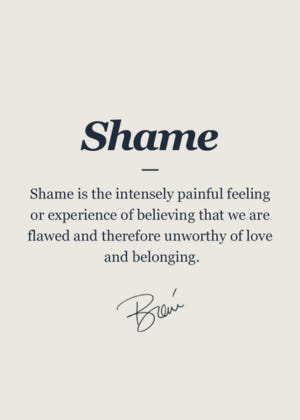
All I could muster to friends was, “I had surgery,” or “We’re going through a tough time right now.” But I couldn’t find the words to explain it. I was so angry at the world for not giving me empathy and understanding, but at the same time, I was incapable of telling people why I was struggling, why I was bitter, and why I was alienating myself. Then it got worse. When people stopped showing up for me, I took it personally. It hurt. But after a lot of work, I’ve learned that people can’t understand or show up for you if you don’t communicate that you’re struggling. You have to let them be there.
I blamed myself. The first time, I thought it was my fault for drinking too much iced tea, taking the medication I needed to stop vomiting, and that one time my dog jumped and barely tapped my belly. The second time, I blamed the CT scan. How selfish of me? I blamed the lack of diversity in my diet. I blamed my body. I blamed anything I could think of.
What I Needed
I was able to share my experience with a few close friends and family, but the circle was small. Looking back, I realize that if I had been able to openly talk to more people about it, that would have been what I needed. Everyone’s experience is completely different, but for me, it was the following:
Validate, validate, validate.
"I'm sorry that happened. I can’t begin to imagine how difficult that must be."If you don’t know what to say, that’s okay.
"I’m not really sure what to say or do, but I’m here now and whenever you need me moving forward."Simply offer to help.
It could be letting me rant, driving my kids to practice so I can have a few minutes to myself, or dropping off dinner.
“How can I help?”The opportunity to ramble without guilt.
Just a simple act of nodding, holding my hand, listening, and saying, "Tell me more…”Follow up often.
I cannot reiterate this enough: you do not heal from a miscarriage after a week or a month. We never “move on” or “get over” this type of loss—it stays with us forever. The grieving process is a long journey. Something as simple as, “Hey, I noticed it’s February, and I can imagine this month may be tough for you,” or, “Just checking in—how are you?” means so much.Avoid Cliché Sayings.
I never got angry at people for saying things like this, but for me personally, they didn’t help. They made me spiral more. Things like, “God only gives you what you can handle,” or “At least you have your two!” or “At least it wasn’t a stillbirth,” or “Everything happens for a reason.” They just made me angry. I can’t handle more kids? My ability is limited to two, while others can have more? Happens for a reason? What’s my reason? I’d still like to know.
Jessica Zucker, the author of I Had a Miscarriage, has created empathy cards to give to someone who is struggling with a loss. This helps people who are unsure of what to say to a woman who is grieving this type of loss. Every single card has a saying that I would’ve loved to hear.
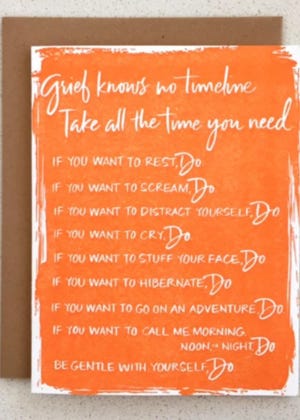
Community: I am so grateful for my community that showed up for me. It was small, but it was the few friends and family I could muster the words to reach out to. Texts that simply said, “How are you today?” or asking me to go for a walk, letting me talk about my experience a million times, offering to take my kids for a few hours, inviting me out for dinner—these small gestures meant the world to me. I cannot reiterate enough how important it is to have people show up for you beyond the first week after a miscarriage. People naturally assume their own timelines of when you should be, “back to normal.” Again, we need to remember that there’s no timeline for grief of this magnitude.
Professional Support: After my first loss, I was convinced I could carry the burden and trudge through it all on my own. I didn’t need help. I didn’t need a therapist. I was strong. Therapy was for weak people—or so I thought. I was wrong. After my second loss, I connected with a therapist who specializes in women’s health, and it has truly changed my life. We’ve been working through my losses for a year now, and I couldn’t be more grateful. What we don’t always realize is that the feelings and trauma from loss can rear their heads in situations that seem completely unrelated to miscarriage.
My therapist and I had to process and work through that together. She helps me see the world through different lenses. She reminds me of my strengths, builds me up when I’m down, and helps me navigate emotions that can sometimes feel completely overwhelming.
The Body That “Failed” Me
All that rambling to get me here.
Let this post serve as a reminder: there’s so much more to a person and their journey than what you see on the outside.
Each of us carries an invisible backpack.
What people don’t always realize is that, for the first time since 2020, I’ve stopped hating myself. I’ve done the hard, quiet work to stop hating my body. And it’s taken more effort than I can even put into words.
When you're pregnant, people act like they have the right to comment on your body all the time. I remember hating that during my pregnancies. I didn't want anyone touching my stomach, and I especially hated when they did it without asking.
When your body changes but you experience a loss, it's a whole different story. I felt like I had no excuse for my belly protruding or the extra 10 pounds. No reason for hormonal breakouts all over my face. No reason for my jeans not to fit. It just all felt so unfair.
After each loss, I felt like a prisoner in my own body. It felt like my body had failed me. Every time I tried on clothes that no longer fit, it reminded me of what could have been. When my jeans didn’t button, I hated myself. I had gone through part of the journey, but had nothing to show for it—just an unflattering tummy and a few extra pounds from comfort-eating bagels.
I saw my body as a failure. I was just so angry at it.
I just wanted everything to go back to normal, but what didn’t change was my waistline. Clothing didn’t fit the same. After having my son and daughter, this didn’t bother me because I had something to show for it—the finished product. With my two losses, it felt different. I just looked "fat." Every time I looked at my stomach, the painful memories came rushing back. Trying on jeans, watching them not fit, and spiraling into tears became a painful cycle. I wanted to erase any evidence of my failed pregnancies. I spoke so negatively about my body. I did it in front of my daughter, which is something I will never do again.
How I Learned To Love My Body Again:
Compassion: I started treating my body with more compassion. This body earned me a scholarship to a Division One school for lacrosse, where I had a decorated career playing the sport I loved. This body gave me my two amazing gifts: my son and daughter. This body ran three half marathons. This body held my babies. This body walked down the aisle with my husband, my person since I was 16. You only have one body. You have to honor it, love it, and accept it through every chapter of your life.
My Relationship With Exercise: I improved my relationship with exercise. Right after the losses, I threw myself into Orange Theory-style HIIT workouts, working out multiple times a day. I was angry at my body and felt the need to prove I could do the most. But I realized this wasn’t helping. I began focusing on repairing my pelvic floor muscles. Some days, I only stretched. Most days, I simply take time to walk. And that is enough.
Wear Clothing That Fits: I bought things that fit me and made me feel good. Instead of crying every time I tried to put on a pair of jeans that were too small, I took the time to get a few things that felt right. I didn’t want to spend crazy money on a whole new wardrobe, but I did invest in a few essentials that helped me feel better about myself. Elastic waistbands, loose dresses, and simply sizing up without shame.
Limiting Media Consumption: I limited my media consumption more. I started unfollowing accounts that were triggering negative thoughts about my body. Comparison is truly the thief of joy.
Leave Conversations That Trigger You: I left conversations where people were critiquing their bodies. Sometimes I physically walked away, and other times I just mentally checked out of the conversation. I stopped engaging or participating because it only made me feel worse—especially if they looked a million times better than me. It made me feel like I should be critiquing myself, which never ended well.
Connect With Others: I started talking to more people. I didn’t want to start a secret miscarriage club that no one wants to be a part of. However, when people gave me the opportunity to share my story and were able to share their own, it helped me feel less alone. Let’s make a commitment to stop whispering about miscarriage.
I Am More Than My Body: I reminded myself that my body is a vessel. And a beautiful, important one at that. However, I am more than just that. I am smart. I am empathetic. I am inclusive. I love to help others. I love to empower others. I am creative! Here’s another book I read that really helped me with this, it’s called More Than A Body by Lexie and Lindsay Kite.
Facts Helped Me: I did the research and found enough studies to reassure me that my body is not to blame. The cause of miscarriages is beyond anyone’s control. Chromosomal abnormalities account for about 50% of miscarriages in the first trimester. Other factors can include hormonal imbalances, improper implantation, age, uterine abnormalities, incompetent cervix, lifestyle, clotting disorders, immune system disorders, and more. I had to learn to shift the blame away from myself. Carrying that shame on my shoulders for the rest of my life would never serve me.
Getting myself to this Substack publication that you’re reading right now didn’t happen overnight. It took layers and layers of work to get me to a place where I could look at a photo of myself and not want to cry.
I’m not sure if this is what you signed up for, but I needed to do this. I needed to do this for me—and I needed to do this for other women out there who feel alone right now. You are not alone. I also needed to do this for the people out there who feel like everyone else is thriving in life while they’re silently suffering with their own battle. Social media is fake, We’re all works in progress.
I also thought about, now that I’ve dropped this big emotional bomb in people’s inboxes… now what? Will they feel weird when they see me? Will it be awkward?
No. You don’t need to apologize for not knowing something I didn’t tell anyone. You don’t need to say “I’m sorry” the next time you see me. You just need to continue showing up as you are. If you’re here, you’re somehow part of my community. And for that, I’m eternally grateful.
If you have a story, don’t be afraid to tell it. So many of us need to hear it.
Thanks for reading.
If you enjoyed this post, share it with someone who might need to hear it. I’d love to hear your thoughts whenever you feel ready—feel free to leave a comment or reach out on social if you’d like. Sending love to anyone who needs it today. We can support each other in ways that truly matter.
I’d like to personally thank Dr. Zucker for taking the time to read this Substack post before I hit publish. When you're just weeks away from releasing your next book and still make space to see and hear the people whose lives you’ve impacted — that’s the mark of an incredible human being.
You can follow Dr. Jessica Zucker on Instagram @IHadAMiscarriage. Her book I Had A Miscarriage truly changed my life. Her newest book “Normalize It” is out on April 22, 2025.
Let’s stay connected:
Instagram: @timelesslytraci
Email: timelesslytraci@gmail.com
Substack: Rambling In Style with Traci
P.S. If you’ve got a story, share it. We need to hear it. 💛



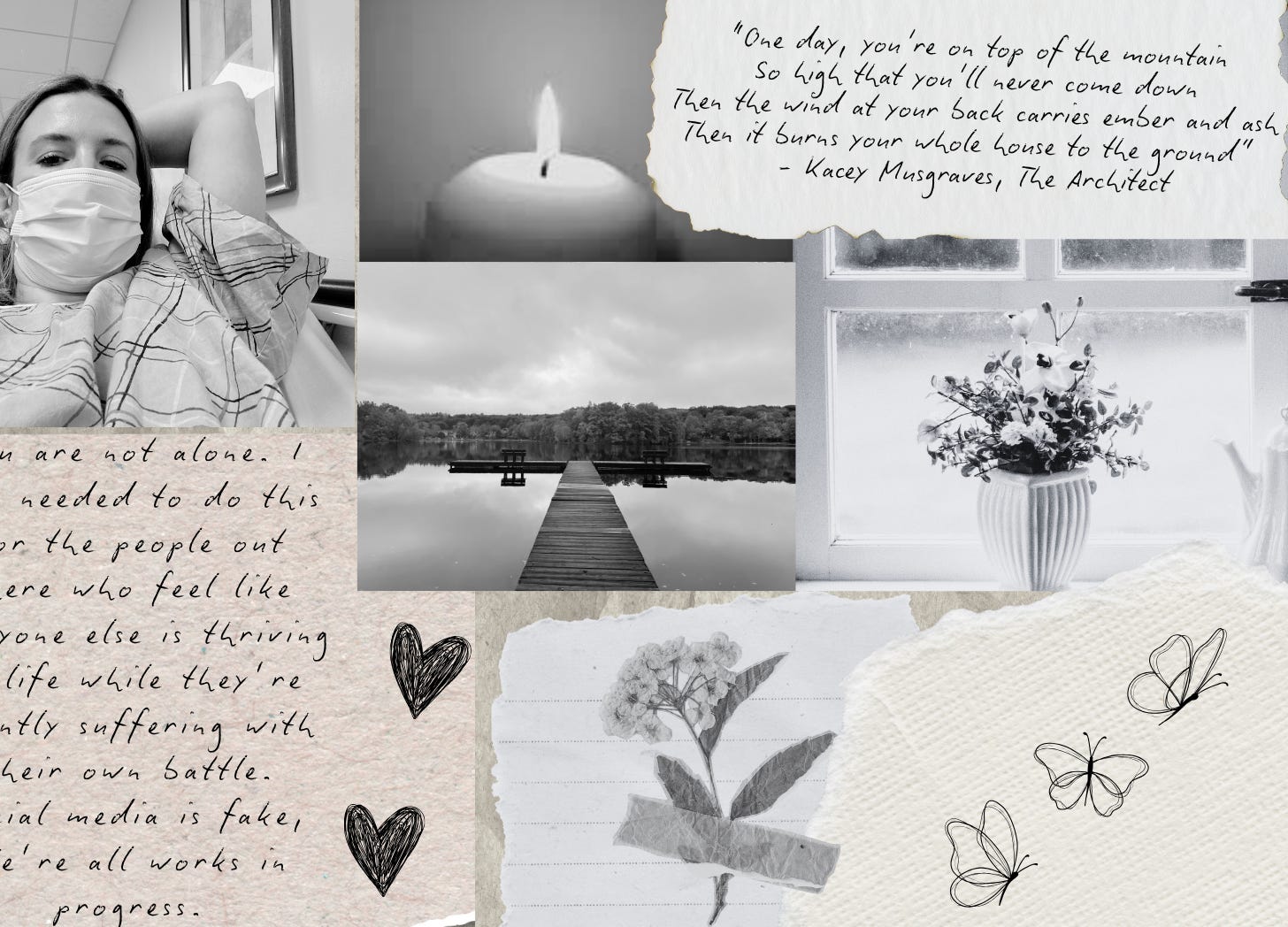
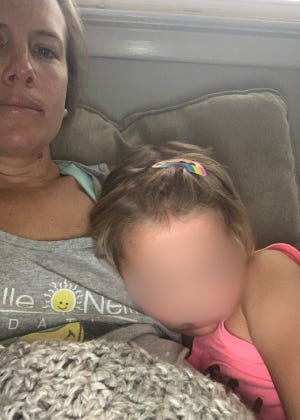

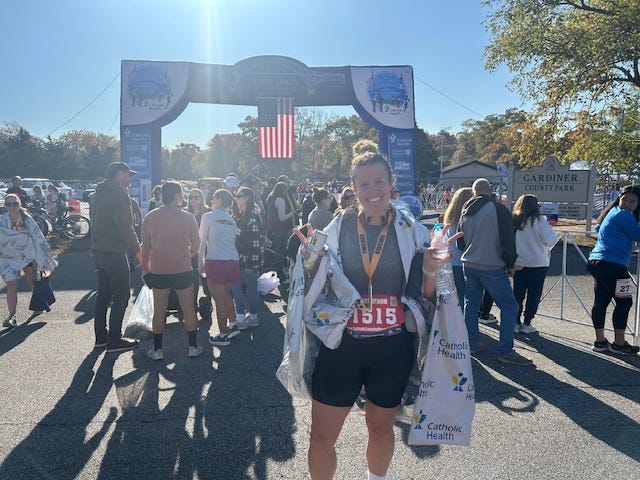
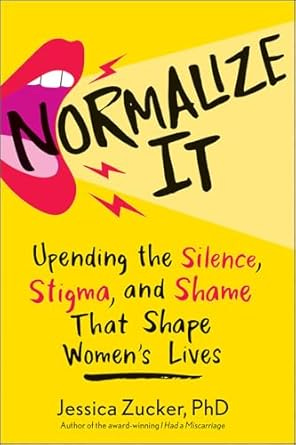
Thank you for taking the time to read this novel of a Substack post. Your support has been pivotal to my healing journey and getting to this point. xo
Traci, from the bottom of my heart, thank you for this. I’m sitting in my kitchen sobbing after reading. This past Tuesday would have been my due date, and for the first time I opened up to friends, family, and colleagues with a post about my loss, with an emphasis on how the only thing that’s truly helped an otherwise horrible situation has been opening up to others. I had no idea how many of my friends had been through what I went through since no one talked about it. The response over the past few days has been overwhelming - so many people have reached out, checked in, told me their stories. Does it still hurt? Absolutely. Does it feel better than suffering in silence, alone? ABSOLUTELY.
Thank you, thank you, thank you ❤️